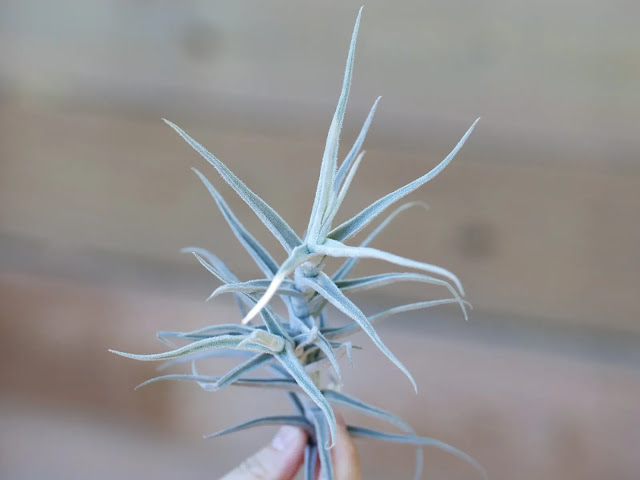Tillandsia paleacea, also known as coniferous air plant, is a unique and showy Tillandsia species native to Central America. It's a relatively low-maintenance plant, making it an excellent choice for beginners. Here's a care guide to help you keep Tillandsia paleacea healthy and thriving.
Light: Tillandsia paleacea needs intense and indirect light. It tolerates some direct sunlight, but too much can cause leaf burns.It is best to place the plant near a south, east or west window with some shade. If you grow the plant indoors, consider using fluorescent lights to provide adequate light.
Water: Like other aerial plants, Tillandsia paleacea does not require soil to grow. Instead, it absorbs moisture and nutrients through the leaves. To keep the plant healthy, it is recommended to soak it in water for 30 minutes once a week, making sure the leaves are fully submerged.Then allow the plant to dry completely before placing it back in the container. You should also mist the plant regularly, especially if you live in a dry environment.
Humidity: Tillandsia paleacea thrives in high humidity, so it's important to keep them moist. If your home is dry, consider using a humidifier or placing a bowl of water near the plant to increase humidity.
Pot: Tillandsia paleacea does not need to be potted as it can be fixed to a variety of surfaces such as beach wood, rocks or shells.This makes them a great option for creating unique hanging air plant displays.
Fertilization: Regular fertilization is beneficial for Tillandsia paleacea. You can use special fertilizers for air plants or a balanced, water-soluble fertilizer diluted by half. Fertilize the plant every two weeks during the growing season and monthly during the dormant period.
Pruning: Pruning Tillandsia paleacea encourages new growth and helps keep the plant healthy.To prune, remove any yellow, brown, or dead leaves from the base of the plant.
Reproduction: Tillandsia paleacea can be propagated by offshoots or "pups". grows at the base of the mother plant. Once the young have developed roots, they can be detached from the mother plant and placed in containers.
Diseases and Pests: Tillandsia paleacea is generally resistant to pests and diseases, but can be susceptible to rot if kept in excessively wet or humid conditions. To reduce the risk of rot, soak the plant in water once a week and let it dry completely before placing it back in the container.
Overall, Tillandsia paleacea is a low-maintenance air plant that can add a touch of natural beauty to any living space.To keep them healthy and thriving, provide them with bright, indirect light, high humidity, regular fertilizing, and regular soaking and misting. It does not need to be planted in containers, making it a great option for those who want to add some greenery to their home but don't have a green thumb. If you encounter any problems, don't hesitate to seek advice from air plant enthusiasts or gardening experts. With proper care, Tillandsia paleacea will continue to bloom and produce
magnificent leaves.


